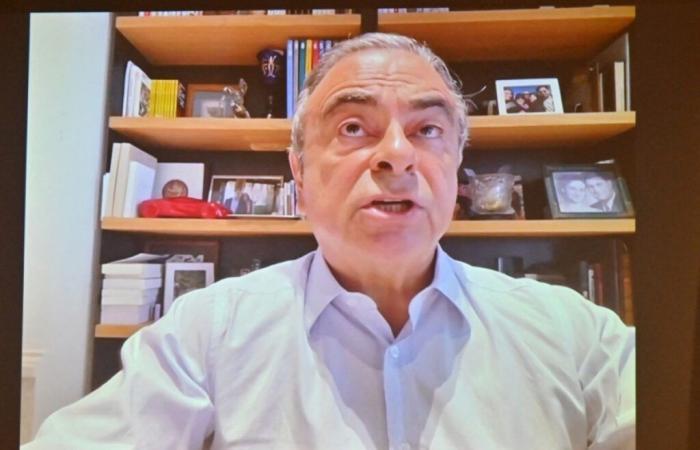
According to several Japanese media, the two manufacturers want to finalize a merger agreement by June 2025.
Carlos Ghosn, during a videoconference, in July 2023 (illustration) (AFP / RICHARD A. BROOKS)
“Frankly, I wonder how this is going to work.” During a remote interview with Japanese journalists, Carlos Ghosn, the ousted ex-boss of Nissan, said Monday (December 23) that the struggling Japanese automaker was in “panic mode” as it begins negotiations with a view to a merger with its great rival Honda.
Nissan announced in a press release that
the two companies had agreed to open negotiations with a view to a merger likely to give birth to the world number three in the sector.
Mitsubishi Motors, of which Nissan is the main shareholder, will be able to join discussions to integrate the new industrial alliance within a “single holding company”.
Carlos Ghosn, arrested in Japan in 2018 on suspicion of financial embezzlement, fled the country hidden in a crate of musical equipment the following year while on bail.
Last month, heavily indebted Nissan announced it would cut 9,000 jobs from its global workforce and cut its production capacity, after suffering an unexpected net loss in the last quarter and seeing its operating margin almost completely melt away. Mr. Ghosn said he was “not absolutely convinced that (Nissan) has the necessary talents to meet the challenges it faces.” According to him, the group is today
“in panic mode, begging his eternal enemy”
Honda. Honda and Nissan, respectively the second and third largest Japanese automakers behind Toyota, aim to finalize a merger agreement in June 2025, according to several local media.
Mr. Ghosn, who denies any wrongdoing and says he fled Japan because he did not think he could benefit from a fair trial, ruled that Nissan had “marginalized itself due to its own mistakes”.
“There are duplicates everywhere!”
“Honda is much stronger than Nissan, but is still not a developing force in this industry” in the face of the strategic shift in electric vehicles, a niche dominated by Chinese manufacturers and the American Tesla, he said. added.
He also said he was “surprised” by the news of this merger because “there is no complementarity” between Nissan and Honda, whose strengths and weaknesses are in the same areas.
“From an industrial point of view, there are duplicates everywhere. So it doesn’t make sense to me,”
he still estimated. Although the two companies may be able to “find synergies for the future, I don't see anything obvious in this partnership or alliance.”
Taiwanese electronics assembly giant Foxconn (Hon Hai) also approached Nissan to acquire a majority stake, according to the Japanese press, precipitating the opening of negotiations with Honda. If the Japanese government does not want to lose control of Nissan and prefers it to be “in the hands of another Japanese interest, then that makes sense politically,” Ghosn conceded. “But this means that once again, we are putting control before performance,” he added.





